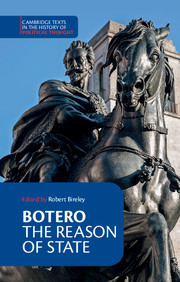Description
Botero: The Reason of State
Cambridge Texts in the History of Political Thought Series
Author: Botero Giovanni
Coordinator: Bireley Robert
This highly influential anti-Machiavellian text is an important primary source for the understanding of early modern political thought.
Language: English
Subject for Botero: The Reason of State:
Approximative price 31.58 €
In Print (Delivery period: 14 days).
Add to cart
Botero: The Reason of State
Publication date: 09-2017
270 p. · 13.7x21.5 cm · Paperback
Publication date: 09-2017
270 p. · 13.7x21.5 cm · Paperback
Approximative price 96.56 €
In Print (Delivery period: 14 days).
Add to cart
Botero: The Reason of State
Publication date: 09-2017
270 p. · 14.3x22.4 cm · Hardback
Publication date: 09-2017
270 p. · 14.3x22.4 cm · Hardback
Description
/li>Contents
/li>Biography
/li>
Niccolò Machiavelli's seminal work, The Prince, argued that a ruler could not govern morally and be successful. Giovanni Botero disputed this argument and proposed a system for the maintenance and expansion of a state that remained moral in character. Founding an anti-Machiavellian tradition that aimed to refute Machiavelli in practice, Botero is an important figure in early modern political thought, though he remains relatively unknown. His most notable work, Della ragion di Stato, first popularised the term 'reason of state' and made a significant contribution to a major political debate of the time - the perennial issue of the relationship between politics and morality - and the book became a political 'bestseller' in the late sixteenth and the seventeenth century. This translation of the 1589 volume introduces Botero to a wider Anglophone readership and extends this influential text to a modern audience of students and scholars of political thought.
Part I. Book 1; Part II. Book Two; Part III. Book Three; Part IV. Book Four; Part V. Book Five; Part VI. Book Six; Part VII. Book Seven; Part VIII. Book Eight; Part IX. Book Nine; Part X. Book Ten; Part XI. Appendix A; Part XII. Appendix B; Part XIII. Appendix C; Part XIV. Appendix D.
Robert Bireley is Professor of History Emeritus at Loyola University, Chicago, and has received fellowships from the Institute for Advanced Study in Princeton and the National Humanities Center in North Carolina. Recent works include Ferdinand II: Counter-Reformation Emperor, 1578–1637 (Cambridge, 2014).
© 2024 LAVOISIER S.A.S.




